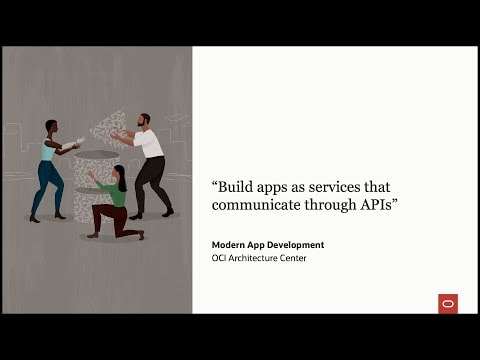API Management
Oracle Cloud Infrastructure (OCI) provides a comprehensive set of services to manage the lifecycle of APIs (application programming interfaces). The built-in tools make it easy for developer teams to collaborate on prototyping, testing, and validating APIs. Oracle Cloud Infrastructure API Gateway provides integration, acceleration, governance, and security for API and SOA-based systems, enabling teams to manage and deliver web APIs securely. In addition, usage plans and subscriptions allow API operators to monitor and monetize APIs.
Build and secure APIs and web applications
Describe APIs with OpenAPI—create, deploy, operate, and protect APIs as well as web/mobile applications with policies.
Design
Prototype APIs easily
Developers can choose from a wide range of tools to create API descriptions in OpenAPI format which is supported by OCI API Gateway.
OpenAPI support
Support for the widely recognized OpenAPI standard enables third-party developers to easily adopt your organization’s APIs.
Improve efficiency in the design process
With stock response API support via OCI API Gateway, an API description can be quickly prototyped and tested by development teams. Having early feedback can help the team eliminate risk in writing the code.
Update API code directly from the OCI console
You can use Code Editor to quickly edit API specifications directly within the OCI console. Code Editor comes with Git integration, automatic versioning, personalization, and built-in integration with OCI services.
API and app security
API security
Secure your APIs using JSON Web Tokens provided by Oracle Identity Cloud Service, Okta, Auth0, and other third-party identity providers. Create APIs that support cross-origin resource sharing (CORS) for web page interoperability.
Rate-limiting policies
Rate limiting for APIs can throttle traffic to back-end services, controlling exposure to the internet and protecting against denial-of-service attacks.
Web application
OpenID Connect is used as a common enforcement point for apps and APIs as well as a means to proxy authentication for applications unable to support the OpenID Connect flows directly.
Deploy APIs
Oracle-managed API front end
Oracle API Gateway is a highly available virtual network appliance that can receive API calls at scale and route them to OCI back-end services, such as load balancers, compute, Kubernetes, and serverless functions.
Deploy APIs privately or publicly
Based on their application’s requirements, API developers can restrict API access within a private network (a regional subnet) or enable API access from the internet.
Serverless APIs
Serverless APIs using OCI API Gateway and Oracle Functions can automatically scale up and scale down resources based on demand, eliminating infrastructure operations.
Track usage and monetize APIs
Create usage plans
API managers can create usage plans within API Gateway and define API access tiers. Usage plans and subscriptions can be shared with internal user groups and the external developer ecosystem.
Manage subscription
API managers can manage subscriptions and entitlements, enabling API consumers to subscribe to APIs.
Drive value from usage
API teams can monitor the traffic and analytics of their APIs based on the usage plan and subscriptions. This enables customers to analyze usage patterns as well as unlock new revenue streams by monetizing APIs.
API Management use cases
-
Extend SaaS applications with cloud native
Design and deploy a SaaS extension for Oracle Fusion Applications using Oracle Visual Builder, Oracle Functions, and Oracle API Gateway.
-
Build an API
Prepare, design, and prototype APIs by defining application domain semantics and deciding on the API architectural style.
-
Secure, RESTful API Gateway as a façade
Create a proxy to authenticate with identity providers and provide access to multiple RESTful services both in the cloud and on-premises.
API Management reference architectures
API design is essential to cloud native development
Robert Wunderlich, Product Strategy Director
Cloud native is gaining in popularity as more developers look to build highly scalable and maintainable solutions. But what does cloud native really mean, and how are APIs related?
The Cloud Native Computing Foundation provides the following definition of cloud native...
Read the complete postFeatured blogs
- April 14, 2021 Response caching in API Gateway
- April 14, 2021 Announcing API request validation for OCI API Gateway
- April 8, 2021 Announcing SDK integration for APIs on API Gateway
- October 15, 2020 Announcing OpenAPI support in API Gateway
Resources

The differences between APIs and messaging for application communication
Learn what’s new in latest release of API Gateway, Apiary, and API Platform.
Getting started with API Gateway, Apiary, and API Platform.
FAQs: API Gateway (PDF), Apiary, and API Platform.
Visit the architecture center
Reference architectures
Try a short hands-on activity
Related cloud products
Get started with API Management
Take a free trial
30 days of access to Oracle Cloud.
Quick start for API Gateway
Instructions to quickly create, deploy, and call your first API
Try Apiary for free
Powerful API design stack that's built for developers.
Contact us
Reach our associates for sales, support, and other questions.

















